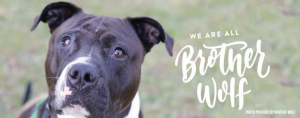Elizabeth Ritch
News Writer
[email protected]

Brother Wolf Animal Rescue strives to build no-kill communities by providing resources and life-saving programs.
Executive Director of Brother Wolf Leah Craig Fieser said behavioral euthanasias at the shelter are always in the community’s best interest, despite public protests.
“I feel like it’s been blown a little bit out of proportion. People may be surprised to know that less than 1 percent of our dogs were euthanized for behavior concerns because it seems a lot bigger than that in the headlines,” Fieser said.
According to Fieser, experts agree aggression in dogs can’t be untrained, only managed.
“Even in a highly managed environment such as a shelter where you have trained staff members working with these dogs, mistakes still happen,” Fieser said. “We highly managed it. Zurich wore a muzzle every time he was out in public and that’s the reason more people didn’t get bit.”
Joelle Warren, who worked with Brother Wolf before the rescue diverged from her original vision, said in a previous interview many dogs at the shelter are wrongfully euthanized.
According to the executive director, a dog named Zurich, which Warren and many in the Facebook group BWARe b Their Voice point to as being wrongfully euthanized, injured several people.
“Dogs who are aggressive are usually only aggressive about 5 percent of the time,” Fieser said. “It’s hard for people to understand why Katarina can take a photo of Zurich and have her face next to his head and also justify that he has bitten multiple people, attacked multiple people and showed offensive aggression.”
Offensive aggression occurs when dogs reduce space between themselves and a person in order to attack, according to Fieser.
Rebecca Roberts, former medical manager at Brother Wolf, said behaviorally challenged dogs can be managed and rehabilitated. Now working with Warren at her animal rescue, Thrift Hound, she said her close friend rescued an aggressive dog whose behavior was well managed.
“Joelle pulled him from someone and he had a history of resource guarding,” Roberts said. “So, in order to let Tracker live a happy life he needed to have his area where his stuff was and no one or no other animal would try to take that stuff from him. He went to my best friend Paula Huntly. She kept him for seven years with no incidents at all in her home. She managed all his needs.”
Fieser said few people discuss what happens when aggressive dogs are released into a community. In an article published by Brother Wolf last month about changes being made at the shelter, the organization cited three different instances where aggressive rescue dogs maimed two people and killed another dog in front of a child. According to her, these instances were very damaging to rescues.
Fieser said Brother Wolf has three options when it comes to caring for aggressive dogs.
“We can adopt out the dog and hope for the best, which we feel to be an irresponsible choice. We can euthanize the dog and face the backlash, which we think is the responsible choice and we’re ready to walk the walk and be very transparent in what we’re doing. The other choice is to warehouse them and just keep them in a cage for the rest of their life,”Fieser said.
Passing these choices on to an adopter is inhumane and irresponsible, Fieser said.
Roberts said Brother Wolf’s 95 percent live release rate is not accurate.
“I think that it’s important for people to know that when Leah Craig says that their live release rate is at 95 percent, that percentage incorporates all the animals. When you’re looking at that number you’re seeing 95 percent and you think OK well that’s only 5 percent of animals that have been failed. That’s not how it is. The transparency is that 95 percent incorporates animals that were transported, that were never really even at the adoption center, animals that were community cats,” Roberts said.
According to Roberts, she would like to see a live release statistic incorporating only the dogs Brother Wolf takes in.
BEWARe b Their Voice recently made a post about a cease and desist notice sent to the executive director of Brother Wolf. The lawyer who penned the letter, Andrew M. LaBreche Esq., could not be reached for comment. Fieser said she is not concerned about the letter, as it has not been signed by a judge and is not backed by any evidence.
Fieser said Brother Wolf has no plans to change its new policies.
“The policies that we have in place are not earth-shattering. They’re very much in line with practices that are in place in thousands of animal shelters across the country,” she said.


![Brooke Pedersen [second from the right] and Luis Reyes [right] hold banners during the Wrap The Woods event.](https://thebluebanner.net/wp-content/uploads/2025/09/ELIZABETH_PRITCHITT_IMG_3470-1200x804.jpg)















